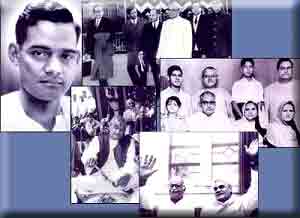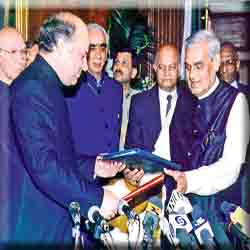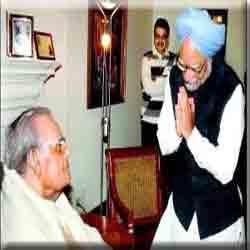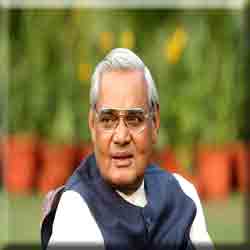Atal Bihari Vajpayee
Personal Life
Atal Bihari Vajpayee more popularly known as Vajpayee was referred by the by the previous Prime Minister Dr. Manmohan Singh as the Bhishma Pitamah of Indian Politics. Atal Bihari Vajpayee takes the credit of being the eleventh Prime Minister of India. Atal Bihari Vajpayee the Indian statesman was born on 25 th December 1924 in Gwalior. He was born in middle class Brahmin family to Krishna Bihari Vajpayee and Krishna Devi. The root of Atal Bihari Vajpayee is from a small village Bateshwar in Uttar Pradesh. His grandfather was Pandit Shyam Lal Vajpayee and his father Krishna Bihari Vajpayee was a poet and a school master in the village of Bateshwar. Later they all migrated from Bateshwar to Gwalior where Atal Bihari Vajpayee studied in Saraswati Shishu Mandir, Gorkhi, Bara, Gwalior. He was a graduate from Victoria College in Gwalior which is now known as Laxmi Bai College. He came out with flying colors with distinction in Hindi, English and Sanskrit. Atal Bihari Vajpayee also secured a first class degree in his masters with a specialization in Political Science from DAV College, Kanpur.
His grandfather was Pandit Shyam Lal Vajpayee and his father Krishna Bihari Vajpayee was a poet and a school master in the village of Bateshwar. Later they all migrated from Bateshwar to Gwalior where Atal Bihari Vajpayee studied in Saraswati Shishu Mandir, Gorkhi, Bara, Gwalior. He was a graduate from Victoria College in Gwalior which is now known as Laxmi Bai College. He came out with flying colors with distinction in Hindi, English and Sanskrit. Atal Bihari Vajpayee also secured a first class degree in his masters with a specialization in Political Science from DAV College, Kanpur.Atal Bihari Vajpayee never married and he remained as a bachelor throughout his life, but however he adopted a girl child as his daughter and named Namita. He has lot of personal liking towards Indian Music and dance. Vajpayee is an ardent lover of nature and one of his favourite retreats is Manali in Himachal Pradesh. But however age catches up with every individual so is with Vajpayee too. In the year 2001 he knee replacement surgery at Breach Candy Hospital in Mumbai. Later in 2009 he was affected with his speech because he had an attack of a major stroke.
Atal Bihari Vajpayee's health is of a major concern today for those who are in the know to Vajpayee says that his health condition is very poor for he is most of the time is concerned to wheel chair and is suffering from dementia and long-term diabetes. His dementia fails him to recognize people. All these ailments of Vajpayee are preventing him to attend any public function in the recent years. Other than for health checkups to All India Institute of Medical Sciences in Delhi Atal Bihari Vajpayee is not seen anywhere out of the house. Also in his early years he was most of the time be visited by people from his party and political heads but now hardly people visit him these days.
Some of the few people who somehow make it to visit Vajpayee are Advani and B C Khanduri, who come to sit by his side and if not possible they call over his daughter to enquire about his health. N M Ghatate, one of Vajpayee's thick and close friends for the past six decades makes it a point to visit Vajpayee on a daily basis. Also our Prime Minister, Dr. Manmohan Singh frequently keeps enquiring about Vajpayee's health and makes a personal visit on the day of Vajpayee's birthday to wish him.
Entry to Politics
 Once Atal Bihari Vajpayee finished his graduation in political science he became a full time worker of the Hindu nationalist organization, Rashtriya Swayamsevak Sangh (RSS). Vajpayee also studied law for a while but in between he changed his idea and decided to become a journalist. The idea of becoming a journalist was mainly influenced to Vajpayee by fact that as a student he had been an activist in India's struggle for freedom.
Once Atal Bihari Vajpayee finished his graduation in political science he became a full time worker of the Hindu nationalist organization, Rashtriya Swayamsevak Sangh (RSS). Vajpayee also studied law for a while but in between he changed his idea and decided to become a journalist. The idea of becoming a journalist was mainly influenced to Vajpayee by fact that as a student he had been an activist in India's struggle for freedom.Atal Bihari Vajpayee worked as an editor for many Hindi editions like ashtradharma (a Hindi monthly), Panchjanya (a Hindi weekly) and the dailies Swadesh and Veer Arjun. His first step to politics took place in August 1942 when Vajpayee along with his elder brother Prem were arrested for participating in the anti-British struggle during the Quit India movement and naming the underground leaders. They were arrested and kept in jail for 23 days and was only released after giving a written statement stating that they will never participate in any of the anti-British struggle.
The Bharatiya Janata Sangh a right-wing political party allied with the Rashtriya Swayamsevak Sangh (RSS) which was formed in 1951 appointed Atal Bihari Vajpayee and assigned work. He soon became a serious follower and adviser of party leader Syama Prasad Mookerjee. At the time of Mookerjee's fasting to death in 1954 in Kashmir mainly to protest against perceived inferior treatment of non-Kashmiri Indian visitors to the state, Vajpayee was with the great leader participating in the struggle. In 1957 Vajpayee was elected to the Lower House of Parliament, Lok Sabha from Balrampur as a member of the Bharatiya Jana Sangh (BJS), a forerunner of the BJP. As already mentioned Vajpayee was a great orator and was very good at organizing things.
All these features of Vajpayee soon made him become the face of Jana Sangh and after the death of Deendayal Upadhyaya; the responsibility of the leadership of Jana Sangh fell on the shoulders of a young Vajpayee. Thus in the year 1968 Atal Bihari Vajpayee became the national president of the Jana Sangh and along with the guidance of Nanaji Deshmukh, Balraj Madhok and L. K. Advani, Vajpayee led Jana Sangh and brought it to national fame. It was in 1977 the Bharatiya Jana Sangh with the alliance of three other parties became the Bharatiya Janata party and led the government till July 1979.As foreign minister in the Janata government in Prime Minister Morarji Desai's cabinet.
Vajpayee earned a reputation for improving relations with Pakistan and China. In 1980 there was rift in the Janata party and the Bharatiya Jana Sangh headed by Vajpayee became the Bharatiya Janata party once again. Atal Biahri vajpayee was extremely good at his oratorical skills which impresses the then Prime Minister Jawaharlal Nehru who during that time itself predicted that he had all the qualities to become a Prime Minister. In 1992 he was one of the few Hindu leaders to speak out against the destruction of the historic mosque at Ayodhya by anti-Muslim extremists.
Political Career
 Atal Bihar Vajpayee takes the credit of being the only Prime Minister from outside the Indian National Congress party to serve a full five-year term from 1998 to 2004. Being a paliamentarian for nearly forty years he was elected nearly nine times to the lower house of the Indian parliament, Lok Sabha and twice to the Upper House, the Rajya Sabha. After his period as the Prime Minister of India Atal Bihari Vajpayee also until 2009 served as the Member of Parliament for Lucknow, Uttar Pradesh till he retired from politics for the main concern of his health issues.
Atal Bihar Vajpayee takes the credit of being the only Prime Minister from outside the Indian National Congress party to serve a full five-year term from 1998 to 2004. Being a paliamentarian for nearly forty years he was elected nearly nine times to the lower house of the Indian parliament, Lok Sabha and twice to the Upper House, the Rajya Sabha. After his period as the Prime Minister of India Atal Bihari Vajpayee also until 2009 served as the Member of Parliament for Lucknow, Uttar Pradesh till he retired from politics for the main concern of his health issues.He was the first President of the BJP and was noted to be a strong critic of the Congress (I) government that followed the Janata government. The BJP under the leadership of Vajpayee fighted against the coming up of Sikh militancy and also held accountability to the then Prime Minister Indira Gandhi for her estranging and corrupt politics that encouraged such militancy at the expense of national unity and integrity. The BJP became the political voice of the Ram Janmabhoomi Mandir Movement, which was led by activists of the Vishwa Hindu Parishad (VHP) and the RSS, and which sought to build a temple dedicated to Lord Rama in Ayodhya.
When the Bharatiya Janata party won in the 1996 parliamentary elections the BJP President L.K. Advani declared that Vajpayee would become the 10th Prime Minister of India and he served as Prime Minister for three successive terms from 1996 to 2004. But however he could not continue for more than 13 days and he had to resign for it was clear that he was not able to gather majority. The 1998 general elections proved majority of the Bharatiya Janata Party along with the unity of bloc of political parties with Vajpayee sworn in as the Prime Minister.
This government lasted for nearly 13 months until mid-1999 when the All India Anna Dravida Munnetra Kazhagam (AIADMK) under J Jayalalithaa withdrew its support to the Government. So the Lok Sabha was once again dissolved and fresh elections were held in 1999, but until then Vajpayee remained as the Prime Minister of India. The 1999 elections also proved the majority of BJP were they won 303 seats out of the 543 seats in the Lok Sabha and once Vajpayee became the Prime Minister of India for the third time.
Awards
1992, Padma Vibhushan 1993, D. Lit. from Kanpur University 1994, Lokmanya Tilak Award 1994, Best Parliamentarian Award 1994, Bharat Ratna Pandit Govind Vallabh Pant AwardSpecialty and Service to the Country
 It was under the leadership of Atal Bihari Vajpayee and during his tenure of Prime Ministership India conducted five underground nuclear tests in Pokhran desert in Rajasthan in May 1998. Also the Lahore summit which was held in 1999 resulted in the full-scale diplomatic peace process with Pakistan during which the bus service between India and Pakistan started. The success of the Kargil War encouraged the facade of Vajpayee and he was appreciated for his eminent leadership.
It was under the leadership of Atal Bihari Vajpayee and during his tenure of Prime Ministership India conducted five underground nuclear tests in Pokhran desert in Rajasthan in May 1998. Also the Lahore summit which was held in 1999 resulted in the full-scale diplomatic peace process with Pakistan during which the bus service between India and Pakistan started. The success of the Kargil War encouraged the facade of Vajpayee and he was appreciated for his eminent leadership.In 26 July 2012, designated as 'Kargil Vijay Diwas', BJP President Nitin Gadkari unveiled a wax statue of Atal Bihari Vajpayee in Mumbai. The statue is to be put up at a wax museum in Lonavala. A number of projects including economic and infrastructural reforms boosting the private sector and foreign investments were all happened during Vajpayee's tenure.
UPA Government on July 1, 2013 accepted before Supreme Court that NDA National Democratic Alliance Government led by Vajpayee has developed half the roads in last 32 years in their 5 year term. In the year 2005 Vajpayee quit from politics and announced his retirement.


